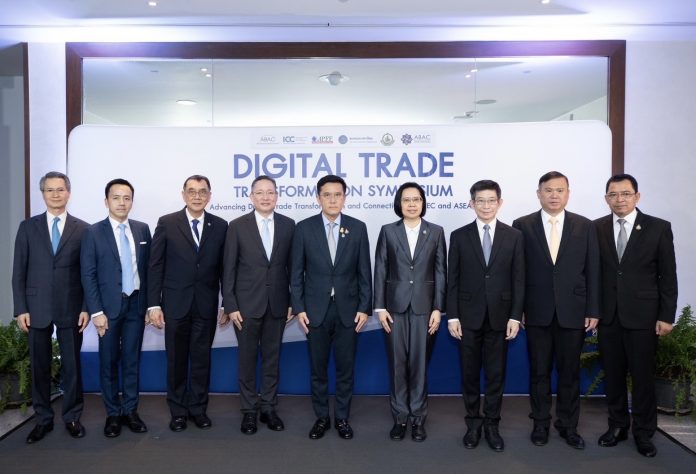NDTP (National Digital Trade Platform) แพลตฟอร์มการค้าดิจิทัลระหว่างประเทศของไทย เป็นโครงการที่ขับเคลื่อนโดยคณะกรรมการร่วมภาคเอกชน 3 สถาบัน (กกร.) คือ สภาหอการค้าแห่งประเทศไทย สภาอุตสาหกรรมแห่งประเทศไทย และ สมาคมธนาคารไทย ซึ่งในเฟสแรก พัฒนาและดำเนินการโดย บริษัท เนชั่นแนล ไอทีเอ็มเอ๊กซ์ จำกัด (NITMX) และบริษัท เบเคอร์ แอนด์ แม็คเค็นซี่ จำกัด เป็นผู้ดูแลจัดการเกี่ยวกับเอกสารสัญญาที่เกี่ยวข้อง
แพลตฟอร์ม NDTP ถูกพัฒนาด้วยเทคโนโลยีบล็อกเชน (Blockchain) และดำเนินการโดย บริษัท เนชั่นแนล ไอทีเอ็มเอ๊กซ์ จำกัด (NITMX) ซึ่งปัจจุบันเป็นผู้พัฒนาและให้บริการโครงสร้างพื้นฐานการชำระเงินของไทย รวมทั้ง PromptPay และได้ขยายบริการไปยังโครงสร้างพื้นฐานการค้าและการให้สินเชื่อ ทั้ง PromptBiz และ Trade Document Registry (TDR) สำหรับธนาคาร เพื่อรองรับการเปลี่ยนแปลงบริการทางการเงินในรูปแบบใหม่ๆ และสนับสนุนการพัฒนาโครงสร้างพื้นฐาน NDTP เพื่อยกระดับความสามารถในการแข่งขันของประเทศไทยในเวทีการค้าโลกต่อไป
แพลตฟอร์มดังกล่าวมีจุดมุ่งหมายเพื่อเพิ่มประสิทธิภาพการดำเนินงานของผู้ส่งออก ผู้นำเข้า และผู้เกี่ยวข้องอื่นๆ เพื่อให้การส่งออกนำเข้า ง่าย สะดวก รวดเร็ว ขึ้น ช่วยป้องกันการทำธุรกรรมในเชิงมิชอบหรือการทำธุรกรรมซ้ำซ้อน และช่วยเพิ่มโอกาสการเข้าถึงแหล่งทุนเพื่อการทำการค้าแก่กลุ่มผู้ประกอบการรายย่อยหรือ SMEs ในประเทศภาครัฐให้การสนับสนุนโดยจัดตั้งคณะอนุกรรมการเฉพาะกิจเกี่ยวกับการศึกษาและการกำหนดแนวทางการพัฒนาแพลตฟอร์มการค้าดิจิทัลระหว่างประเทศของไทย เพื่อขับเคลื่อนหน่วยงานภาครัฐในการสนับสนุนการพัฒนา NDTP ภายใต้สำนักงานคณะกรรมการพัฒนาระบบราชการ
NDTP ประสบความสำเร็จในพัฒนาแพลตฟอร์ม และการทดสอบรายการ Proof-of-Concept (POC)/Pilot Live ในเฟสที่ 1 ร่วมกับ แพลตฟอร์ม TradeWaltz ของญี่ปุ่น และแพลตฟอร์ม NTP (Networked Trade Platform) ของประเทศสิงคโปร์ เรียบร้อยแล้วในเดือนตุลาคม 2565 โดยมีขอบเขตรวมถึงการใช้เอกสารการค้าอิเล็กทรอนิกส์ตามมาตรฐาน UNCEFACT สำหรับใบสั่งซื้ออิเล็กทรอนิกส์ (electronic purchase order) ใบแจ้งหนี้อิเล็กทรอนิกส์ (electronic invoice) และ ใบกำกับหีบห่ออิเล็กทรอนิกส์ (electronic packing list) และเอกสารอื่นๆ ที่ยังเป็นรูปภาพ
สำหรับผู้ส่งออกนำเข้าที่ร่วมทำรายการ POC กับคู่ค้าในญี่ปุ่น คือ บริษัท พีทีที โกลบอล เคมิคอล จำกัด (มหาชน) บริษัท โตโยต้า ทูโช (ไทยแลนด์) จำกัด และบริษัท ยูนิคอร์ด จำกัด (มหาชน)
ผู้ส่งออกนำเข้าที่ร่วมทำรายการ Pilot Live กับคู่ค้าในสิงคโปร์ คือ บริษัท บี.ฟู้ดส์ โปรดักส์ อินเตอร์เนชั่นแนล จำกัด ในเครือกลุ่มริษัทเบทาโกร และบริษัท แปซิฟิก ชูการ์ คอร์ปอเรชั่น จำกัด ในเครือกลุ่มบริษัทน้ำตาลมิตรผล
ในเฟสที่ 1 POC นี้ ได้รวมถึงการตรวจสอบความถูกต้องของเอกสารที่ธนาคารได้รับเพื่อปล่อยสินเขื่อด้วย โดยเป็นการเชื่อมต่อระหว่าง NDTP และ TDR (Trade Document Registry) ซึ่งเป็นแพลตฟอร์มที่เริ่มใช้ตั้งแต่ต้นปี 2565 สำหรับธนาคารที่ให้สินเชื่อแก่ธุรกิจการค้าระหว่างประเทศในการตรวจสอบการขอสินเชื่อซ้ำซ้อน (double financing) โดยมีธนาคารที่ร่วมโครงการระหว่าง NDTP เฟสที่ 1 และTDR ได้แก่ ธนาคารกรุงเทพ จำกัด (มหาชน) ธนาคาร กรุงศรีอยุธยา จำกัด (มหาชน) ธนาคารกสิกรไทยจำกัด (มหาชน) ธนาคารกรุงไทย จำกัด (มหาชน) ธนาคาร ไทยพาณิชย์ จำกัด (มหาชน) และธนาคารทหารไทยธนชาต จำกัด (มหาชน)
การทำงานเฟสต่อไป จะเป็นการก่อตั้ง สรรหา องค์กรและหน่วยงานที่จะพัฒนาและดำเนินการ NDTP ต่อไปเพื่อนำไปสู่การใช้งานจริง ให้ได้ผล บรรลุตามจุดมุ่งหมายอย่างเป็นรูปธรรม
นายชัยวุฒิ ธนาคมานุสรณ์ รัฐมนตรีว่าการกระทรวงดิจิทัลเพื่อเศรษฐกิจและสังคม (ดีอีเอส) กล่าวว่า ประเทศไทยได้เปิดตัวแพลตฟอร์มการค้าดิจิทัลระดับชาติ ซึ่งจะรวมศูนย์และปรับปรุงขั้นตอนการนำเข้าและส่งออก เพื่อให้ประเทศไทยแข่งขันทางการค้าได้มากขึ้น โดยเฉพาะการค้าดิจิทัล โดยนำเสนอความยืดหยุ่นให้ธุรกิจสู่ความเป็นเลิศในโลกการค้ายุคใหม่ ดังนั้น ความสะดวกในการทำธุรกิจจึงเป็นปัจจัยสำคัญในการดึงดูดการค้าและการลงทุนจากต่างประเทศ
 นายผยง ศรีวณิช ประธานสมาคมธนาคารไทย ในฐานะประธานร่วมคณะกรรมการร่วมภาคเอกชน 3 สถาบัน (กกร.) กล่าวว่า ความสำเร็จของ NDTP ในครั้งนี้ ถือเป็นก้าวสำคัญของประเทศไทยในการยกระดับการค้าระหว่างประเทศสู่ระบบดิจิทัล ซึ่งจะทำให้การทำธุรกรรมการค้า การนำเข้า และการส่งออกสะดวก รวดเร็ว และมีประสิทธิภาพ ลดขั้นตอนการจัดเตรียมเอกสารกระดาษ จากการใช้อิเล็กทรอนิกส์ทำการค้า ช่วยเพิ่มประสิทธิภาพการตรวจสอบความถูกต้องของเอกสาร เสริมขีดความสามารถในการแข่งขันให้กับผู้ประกอบการไทย โดยเฉพาะธุรกิจ SMEs สามารถเข้าถึงสินเชื่อได้ง่ายขึ้น ด้วยต้นทุนที่เหมาะสม ขณะที่สถาบันการเงินสามารถตรวจสอบการขอสินเชื่อซ้ำซ้อน (Double Financing) เพื่อพิจารณาสินเชื่อตามศักยภาพของผู้ประกอบการแต่ละรายได้แม่นยำยิ่งขึ้น ซึ่งปัจจุบันธนาคารมีการตรวจสอบผ่านระบบ Trade Document Registry (TDR) อยู่แล้ว
นายผยง ศรีวณิช ประธานสมาคมธนาคารไทย ในฐานะประธานร่วมคณะกรรมการร่วมภาคเอกชน 3 สถาบัน (กกร.) กล่าวว่า ความสำเร็จของ NDTP ในครั้งนี้ ถือเป็นก้าวสำคัญของประเทศไทยในการยกระดับการค้าระหว่างประเทศสู่ระบบดิจิทัล ซึ่งจะทำให้การทำธุรกรรมการค้า การนำเข้า และการส่งออกสะดวก รวดเร็ว และมีประสิทธิภาพ ลดขั้นตอนการจัดเตรียมเอกสารกระดาษ จากการใช้อิเล็กทรอนิกส์ทำการค้า ช่วยเพิ่มประสิทธิภาพการตรวจสอบความถูกต้องของเอกสาร เสริมขีดความสามารถในการแข่งขันให้กับผู้ประกอบการไทย โดยเฉพาะธุรกิจ SMEs สามารถเข้าถึงสินเชื่อได้ง่ายขึ้น ด้วยต้นทุนที่เหมาะสม ขณะที่สถาบันการเงินสามารถตรวจสอบการขอสินเชื่อซ้ำซ้อน (Double Financing) เพื่อพิจารณาสินเชื่อตามศักยภาพของผู้ประกอบการแต่ละรายได้แม่นยำยิ่งขึ้น ซึ่งปัจจุบันธนาคารมีการตรวจสอบผ่านระบบ Trade Document Registry (TDR) อยู่แล้ว
ความสำเร็จของ NDTP เฟสที่ 1 เกิดจากการผนึกกำลังของภาคส่วนต่างๆทั้งภาครัฐและเอกชน ทำให้ประเทศไทยเป็นประเทศแรกๆ ที่มีความคืบหน้าในด้านการค้าดิจิทัลระหว่างประเทศ ซึ่งหวังว่าจะสามารถขยายความร่วมมือในการพัฒนาเชื่อมโยงระบบระหว่างประเทศ และผลักดันให้เกิดการขยายผลการพัฒนาที่เชื่อมโยงกันทั้งในระดับภูมิภาคและระดับโลก พร้อมส่งเสริมให้ทุกกลุ่มธุรกิจมีโอกาสที่เท่าเทียมกันในการทำการค้าและเติบโตอย่างยั่งยืนต่อไป
 นายเกรียงไกร เธียรนุกุล ประธานสภาที่ปรึกษาทางธุรกิจ ABAC ประธานสภาอุตสาหกรรมแห่งประเทศไทย และประธานร่วมคณะกรรมการร่วมภาคเอกชน 3 สถาบัน (กกร.) กล่าวว่า โครงการ NDTP นี้จะช่วยให้ภาคอุตสาหกรรมที่เป็นส่วนสำคัญในการนำเข้าและส่งออกสินค้าของประเทศ มีประสิทธิภาพและขีดความสามารถในการแข่งขันมากขึ้น ปัจจุบันการนำเข้าและส่งออกสินค้ามีมูลค่าสูงถึง 17 ล้านล้านบาทในปี 2564 มีส่วนสำคัญในการขับเคลื่อนเศรษฐกิจของประเทศ โดยเฉพาะอย่างยิ่งในช่วงโควิดที่ผ่านมาภาคการส่งออกสินค้าเป็นเครื่องยนต์หลักในการขับเคลื่อนเศรษฐกิจไทย
นายเกรียงไกร เธียรนุกุล ประธานสภาที่ปรึกษาทางธุรกิจ ABAC ประธานสภาอุตสาหกรรมแห่งประเทศไทย และประธานร่วมคณะกรรมการร่วมภาคเอกชน 3 สถาบัน (กกร.) กล่าวว่า โครงการ NDTP นี้จะช่วยให้ภาคอุตสาหกรรมที่เป็นส่วนสำคัญในการนำเข้าและส่งออกสินค้าของประเทศ มีประสิทธิภาพและขีดความสามารถในการแข่งขันมากขึ้น ปัจจุบันการนำเข้าและส่งออกสินค้ามีมูลค่าสูงถึง 17 ล้านล้านบาทในปี 2564 มีส่วนสำคัญในการขับเคลื่อนเศรษฐกิจของประเทศ โดยเฉพาะอย่างยิ่งในช่วงโควิดที่ผ่านมาภาคการส่งออกสินค้าเป็นเครื่องยนต์หลักในการขับเคลื่อนเศรษฐกิจไทย
ทุกวันนี้การนำเข้าและการส่งออกสินค้าไทยยังมีขั้นตอนและการใช้เอกสารจำนวนมาก มีหน่วยงานที่เกี่ยวข้องมากถึง 20-30 หน่วยงานต่อการนำเข้าหรือส่งออกแต่ละครั้ง ซึ่งใช้เวลาและค่าใช้จ่ายสูงมากเมื่อเทียบกับหลายๆประเทศ ดังนั้น การที่ กกร.ได้ขับเคลื่อนโครงการนี้จะเป็นการอำนวยความสะดวกทางธุรกิจ (Ease of Doing Business) และเพิ่มขีดความสามารถการแข่งขันของประเทศ (Thailand Competitiveness) ได้อย่างมาก สอดคล้องกับข้อเสนอของสภาที่ปรึกษาธุรกิจ (ABAC) ที่เสนอต่อผู้นำเขตเศรษฐกิจ APEC (Letter to Leader) ที่ผลักดันเรื่องการค้าระหว่างประเทศด้วยระบบดิจิทัล (Cross Border Digital Trade)
นอกจากนี้โครงการ NDTP ยังสามารถช่วยเหลือ SME เข้าถึงสินเชื่อทางการเงินได้ง่ายขึ้น เนื่องจากระบบจะมีการเชื่อมต่อกับธนาคารด้วยระบบ Trade Document Registry (TDR) เพื่อตรวจสอบข้อมูลการนำเข้าและส่งออกสินค้าที่น่าเชื่อจากระบบ และตรวจสอบการป้องกันการขอสินเชื่อซ้ำซ้อน (Double Financing) ด้วยเทคโนโลยีบล็อกเชน ทำให้สถาบันการเงินสามารถลดความเสี่ยงจะทำให้การช่วยเหลือ SMEs เข้าถึงแหล่งเงินทุน (SMEs Access to Finance) ได้มากขึ้น
นายสนั่น อังอุบลกุล ประธานสภาหอการค้าแห่งประเทศไทย และประธานร่วมคณะกรรมการร่วมภาคเอกชน 3 สถาบัน (กกร.) กล่าวว่า สภาหอการค้าแห่งประเทศไทย มีความยินดีที่ภาคเอกชนไทยได้พัฒนาแพลตฟอร์ม NDTP เฟสที่ 1และนำไปสู่การทดสอบเชื่อมต่อจนสำเร็จ ความสำเร็จในครั้งนี้ เกิดจากความร่วมมืออย่างเข้มแข็งของทุกภาคส่วนที่เกี่ยวข้องทั้งภาครัฐและเอกชน เพื่อก้าวสู่ระบบการค้าระหว่างประเทศแบบ fully digital ซึ่งสามารถลดต้นทุนและเวลา ช่วยเพิ่มขีดความสามารถการแข่งขัน ตลอดจนเพิ่มความปลอดภัยของข้อมูลและความโปร่งใสในกระบวนการนำเข้า-ส่งออก
สภาหอการค้าแห่งประเทศไทย ได้สนับสนุนการพัฒนาแพลตฟอร์ม NDTP มาอย่างต่อเนื่องและมุ่งมั่นที่จะขับเคลื่อนต่อไปเพื่อยกระดับโดยขยายขอบเขตการเชื่อมโยงข้อมูลกับประเทศต่างๆ ผ่านแพลตฟอร์ม NDTPจึงอยากจะเชิญชวนผู้ประกอบการที่เกี่ยวข้องกับธุรกรรมการค้าระหว่างประเทศให้เข้ามาใช้บริการแพลตฟอร์ม NDTP โดยเราเชื่อมั่นเป็นอย่างยิ่งว่าแพลตฟอร์มนี้จะช่วยทำให้ธุรกรรมการค้าระหว่างประเทศของเราอยู่ในรูปแบบ digital ซึ่งจะเป็นการเพิ่มขีดความสามารถในการแข่งขันของประเทศไทยในอนาคตอันใกล้นี้
นางสาวอ้อนฟ้า เวชชาชีวะ เลขาธิการสำนักงานคณะกรรมการพัฒนาระบบราชการ กล่าวว่า สำนักงาน ก.พ.ร. เป็นหน่วยงานที่ได้รับมอบหมายจากคณะรัฐมนตรีในการพัฒนาแพลตฟอร์ม NDTP โดยใช้กลไกการแต่งตั้ง อ.ก.พ.ร. เฉพาะกิจ เกี่ยวกับการศึกษาและกำหนดแนวทางการพัฒนาแพลตฟอร์มการค้าดิจิทัลระหว่างประเทศของไทยที่ประกอบด้วยผู้ทรงคุณวุฒิจากหน่วยงานที่เกี่ยวข้อง ทั้งภาครัฐและเอกชนร่วมกันพัฒนาต้นแบบ (Prototype) เพื่อทดสอบความถูกต้องของการเชื่อมโยงข้อมูลเมื่อระบบเริ่มปฏิบัติการจริง ส่งเสริมให้เกิดการเชื่อมโยงข้อมูลด้านการนำเข้า-ส่งออกกับระบบ NSW โดยมีหน่วยงานภาครัฐเกี่ยวข้องกว่า 36 หน่วยงาน ตลอดจนปรับปรุงแก้ไขกฎหมายที่เป็นอุปสรรคต่อการค้าดิจิทัล อาทิ การตราพระราชบัญญัติการปฏิบัติราชการทางอิเล็กทรอนิกส์ พ.ศ. 2565 ที่กำหนดให้ภาครัฐต้องให้บริการด้วยช่องทางดิจิทัลเป็นหลัก เพื่ออำนวยความสะดวกและสร้างความเชื่อมั่นแก่ผู้ประกอบการ เพิ่มการขยายตัวทางธุรกิจ และสร้างโอกาสในการแข่งขันของภาคเอกชนไทยในทุกระดับ
สำนักงาน ก.พ.ร. เร่งผลักดันการพัฒนาแพลตฟอร์ม NDTP ในรูปแบบการร่วมลงทุนระหว่างรัฐและเอกชน (PPP) ซึ่งเป็นแนวทางที่มีความเหมาะสมในการนำจุดเด่นของภาครัฐและภาคเอกชนมาดำเนินงานร่วมกันในการให้บริการแพลตฟอร์ม NDTP ให้สามารถเปิดให้บริการได้ภายในปี 2567 ในปัจจุบันอยู่ในขั้นตอนการศึกษาความเป็นไปได้ในการลงทุน (Feasibility) เพื่อให้ NDTP สามารถตอบโจทย์ความต้องการและความคาดหวังของภาคธุรกิจและประชาชนต่อไป
ดร กอบศักดิ์ ภูตระกูล ประธานคณะทำงานย่อยโครงการ NDTP ของสำนักงานคณะกรรมการพัฒนาระบบราชการ กล่าวว่า แพลตฟอร์มการค้าดิจิทัล เป็นส่วนประกอบสำคัญที่จะขับเคลื่อนเศรษฐกิจของประเทศไทยให้มีความก้าวหน้าและเป็นเศรษฐกิจดิจิทัลที่สมบูรณ์ ในการทำงานและการขับเคลื่อนดังกล่าวมีความยากลำบากและสลับซับซ้อน เพราะมีผู้เกี่ยวข้องที่หลากหลายจากทั้งภาครัฐและภาคเอกชน และมีเอกสารที่เกี่ยวข้องกับการนำเข้าและส่งออกเป็นจำนวนมาก รวมถึงการที่ต้องมีการปรับปรุงกฏหมายและระเบียบเพื่อให้เอื้อต่อเอกสารและการทำธุรกรรมดิจิทัล จึงต้องอาศัยความร่วมมือสนับสนุนจากทั้งภาครัฐและภาคเอกชนที่จะมาร่วมกันทำงานแบบบูรณาการทั้งองคาพยพ ดังนั้นความสำเร็จของการพัฒนาระบบและการทดสอบการใช้งานของระบบ NDTP เฟสที่ 1 นับเป็นก้าวสำคัญของการพัฒนาสู่ยุคดิจิทัลของประเทศไทย ผมขอขอบคุณคณะทำงานทุกท่าน ทุกคณะทั้งจากภาคเอกชนและภาครัฐ สมาคมธนาคารไทย กกร บริษัท เนชั่นแนล ไอทีเอ็มเอ๊กซ์ จำกัด บริษัท เบเคอร์ แอนด์ แม็คเค็นซี่ จำกัด สำนักงานคณะกรรมการพัฒนาระบบราชการ สำนักงานพัฒนาธุรกรรมทางอิเล็กทรอนิกส์ (ETDA) ที่ทำงานกันอย่างแข็งขันจนประสบความสำเร็จในก้าวนี้ และขอขอบคุณหน่วยรัฐอื่นๆที่ให้การสนับสนุนอย่างเต็มที่ด้วย
————————–
JSCCIB announcesคณะกรรมการร่วมภาคเอกชน 3 สถาบัน (กกร.)คณะกรรมการร่วมจาก สภาหอการค้าแห่งประเทศไทย สภาอุตสาหกรรมแห่งประเทศไทย สมาคมธนาคารไทย เกิดขึ้นจากมติร่วมระหว่างสถาบันทั้ง 3 สถาบัน ซึ่งเป็นสถาบันหลักภาคเอกชนในการส่งเสริมการค้า การอุตสาหกรรม และการเงินของประเทศ โดยมีจุดมุ่งหมายให้เป็นศูนย์ร่วมความคิดเห็นและข้อเสนอแนะที่เป็นเอกภาพของภาคธุรกิจเอกชน เกี่ยวกับแนวทางในการแก้ไขปัญหาทางการค้าและเศรษฐกิจ และนำเสนอต่อคณะกรรมการร่วมภาครัฐบาลและเอกชนเพื่อแก้ไขปัญหาทางเศรษฐกิจ (กรอ.) หรือเสนอต่อหน่วยงานราชการที่รับผิดชอบเกี่ยวกับปัญหานั้นๆ โดยตรงเพื่อประกอบการพิจารณาในการวางแผนพัฒนาเศรษฐกิจ หรือกำหนดเป็นนโยบาย หรือมาตรการในการแก้ไขปัญหาเศรษฐกิจของชาติ
the success of the first key milestone of Thailand NDTP (National Digital Trade Platform) at Digital Trade Transformation Symposium “Advancing Digital Trade Transformation and Connectivity in APEC and ASEAN”
The NDTP project is driven and owned by the Joint Standing Committee of Commerce, Industry and Banking (JSCCIB), an apex body of the three core private organizations of the Thai business sector and has, the objective of improving efficiency of end-to-end export and import processes and increasing access to financing particularly for SMEs. A special sub-committee under the Office of the Public Sector Development Commission has been established to orchestrate various public sectors in supporting JSCCIB to drive the NDTP.
NDTP Phase 1 has been developed with blockchain technology and operated by National ITMX Company Limited (NITMX), the infrastructure service provider for payments in Thailand such as PromptPay. Recently, NITMX expanded its scope to develop and provide trade infrastructure as well as financing for banks including the Trade Document Registry (TDR) and PromptBiz. NDTP development has been supported by NITMX as this is one of the country’s trade infrastructures designed to strengthen Thailand’s competitiveness in the global trade industry. The legal and documentation components are supported by Baker McKenzie Thailand.
Proof of Concept/Pilot Live of Thailand NDTP 1st phase to digitize international trade documents and processes has been successfully completed thanks to the connectivity with TradeWaltz in Japan and Networked Trade Platform (NTP) in Singapore. Phase 1 is the critical milestone for Thailand to kick start international trade digitization. The scope includes implementation of standards, UNCEFACT, for electronic commercial documents including electronic purchase orders, electronic invoices and electronic packing lists.
The four POC transactions were executed by PTT Global Chemical Public Company Limited, Toyota Tsusho (Thailand) Co. Ltd., and Unicord Public Company Limited with their counterparties in Japan while the other two Pilot Live export transactions were executed by B.Food Product International Co. Ltd. of Betagro Group and Pacific Sugar Corporation Limited of Mitrphol Sugar Group with their counterparties in Singapore.
This Phase 1 also includes authenticity verification of the underlying document for financing by banks by way of connectivity between NDTP and TDR, the platform connecting international trade financing banks which has been operative in providing double financing checking for banks since early 2022. Participating banks in phase 1 NDTP/TDR include Bangkok Bank Public Company Limited, Bank of Ayudhya Public Company Limited, Kasikorn Bank Public Company Limited, Krungthai Bank Public, Siam Commercial Bank Public Company Limited, and TMB Thanachart Bank Public Company Limited.
The next step for Thailand NDTP is to establish a body to take what has been completed in Phase 1 forward, and continue the development and connectivity, in order to start offering services in the commercialization phases.
Mr. Chaiwut Thanakamanusorn, Minister of Digital Economy and Society said Thailand has launched a national digital trade platform, which would centralize and streamline import and export procedures to make Thailand even more competitive in trade, particular digital trade, by offering businesses the flexibility to excel in this new era of global commerce. This platform will improve ease of doing business, which is a crucial factor in order to attract foreign trade and investment to Thailand.
Mr. Payong Srivanich, Chair of the Thai Bankers’ Association and Co-Chair of JSCCIB said: “This achievement of NDTP Phase 1 is indeed a significant milestone in the digital transformation of Thailand’s international trade, which will make export and import easier, faster and more convenient for not only exporters and importers but also all other stakeholders. It will reduce time spent on preparing and processing documents. Banks will be able to verify supporting documents for financing more efficiently in addition to the existing double finance checking on TDR. This will increase access to financing for exporters and importers and in turn increase the competitiveness of Thai exports particularly for SMEs.”
“This Phase 1 success is a result of strong collaboration and cooperation between teams from the private and public sectors, and it has made Thailand one of the first countries in the region to make such progress in digital trade. I hope that this cross-country collaboration and connectivity will be expanded in both breadth and depth to the regional and global levels in order to promote equality in business and sustainable growth.”
Mr. Kriengkrai Thiennukul, Chair of the APEC Business Advisory Council (ABAC) 2022, Chairman of the Federation of Thai Industries (FTI) and the chairman of the Joint Standing Committee on Commerce, Industry and Banking (JSCCIB) said: “The importance of this NDTP project is helping the industrial sector, which is an important part of the country’s imports and exports, in being more efficient and competitive.
Currently, imports and exports of goods worth up to 17 trillion baht in 2021, play an important role in driving the country’s economy. This has been particularly true in the COVID era, where the export sector has been the main engine in driving the Thai economy.”
“Today, the import and export of Thai products still require a lot of procedures and documents. There are up to 20-30 entities involved per each import or export. This is very time-consuming and costly compared to many countries. Therefore, the JSCCIB has driven this project to facilitate business (Ease of Doing Business) and greatly increase the country’s competitiveness (Thailand Competitiveness) in line with the proposal of the APEC Business Advisory Council (ABAC) to the APEC (Letter to Leader) economic zone leaders who drive international trade with the Digital Technology (Cross Border Digital Trade).
In addition, the NDTP project can help SMEs access financial loans more easily. This is because the system will be connected to banks with the Trade Document Registry (TDR) system to verify the credibility of import and export data from the system and checks to prevent double financing using Blockchain Technology. This will allow financial institutions to reduce their risks and help SMEs access more funding sources (SMEs Access to Finance).”
Mr. Sanan Angubolkul, Chair of the Board of Trade of Thailand and Co-Chair of JSCCIB, said: “On behalf of the Board of Trade of Thailand, we are very pleased that the Thai private sector has successfully developed the first phase of the National Digital Trade Platform or NDTP and introduced the connection of the Proof of Concept with Japan’s Trade Waltz platform and Pilot Live with Singapore’s Networked Trade Platform or NTP.”
“This achievement is the result of strong cooperation between all relevant agencies, both public and private, to fully digitize our international trade practices. Benefits of this platform include reducing costs and time, improving the country competitiveness, as well as increasing both data security and transparency in the import-export processes.
The Board of Trade of Thailand has continuously supported the development of the NDTP platform and has committed to drive it to the next level by expanding the connectivity with other countries. Therefore, we would like to invite international trade communities, not only importers and exporters, but also bankers, logistics providers and insurance companies, to join the NDTP platform when ready. We strongly believe that NDTP will fully digitalize our country’s trading system and will definitely enhance Thailand’s competitiveness in the near future.”
Ms. Onfa Vejjajiva, Secretary-General of the Office of the Public Sector Development Commission, said: “The Office of the Public Sector Development Commission (OPDC) was assigned by the Cabinet to develop the NDTP platform by setting up the Public Sector Development Sub-Committee on Thailand’s National Digital Trade Platform comprising experts from relevant agencies, both the public and private sectors. The task was to jointly develop a prototype to test data linking accuracy when the system goes live to operate and enhance import-export information linking with the National Single Window (NSW) in which more than 36 government agencies are involved. Furthermore, improving laws and regulations reduce the digital trade obstacles. This includes the announcement of the Electronic-means Administrative Functions Act B.E. 2565 (EAFA), which aims to encourage government agencies to provide digital services to facilitate and build confidence for entrepreneurs to increase business growth and create competitive opportunities for all companies in the Thai private sector.
The OPDC will accelerate the development of NDTP platform following the model of public-private partnership (PPP), which brings together the strengths of the public and private sectors to work together. The NDTP platform is to be operational by 2024. Currently, it is in the investment feasibility study process that will allow the NDTP to respond to the needs and expectations of business sector and citizens.”
Dr. Kobsak Pootrakul, Chairman of the Sub-Committee of the Office of Public Sector Development Commission for NDTP, said: “A digital trade platform, as a part of digital trade transformation, is a key element to drive the digital economy for Thailand. Driving digital trade transformation is very complex. It requires a lot of time and effort by a large number of parties both government and private sectors, given the number of documents and processes involved in the import and export processes. Laws and rules have to be changed to facilitate electronic trans
































































